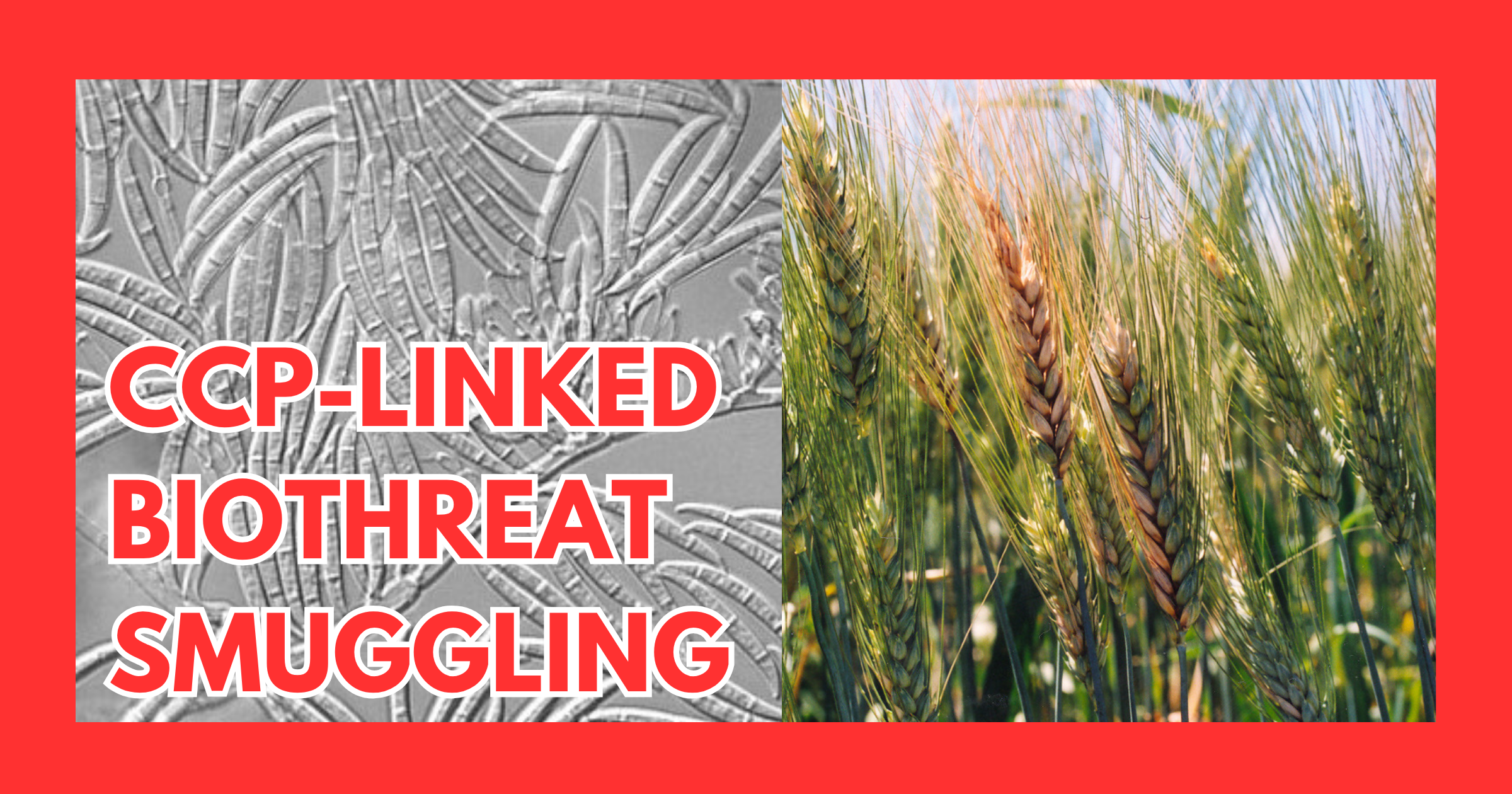
fk ; CSIRO, CC BY 3.0 via Wikimedia Commons
Weaponizing Wheat: CCP Connections Behind a U.S. Agroterror Case
A deadly agricultural fungus. A Chinese researcher with CCP ties. A smuggling plot that stopped just short of a U.S. lab.
by Met Middleson
June 4, 2025
Federal prosecutors have just unsealed charges against two Chinese nationals accused of attempting to smuggle a deadly crop fungus into the United States. The Justice Department alleges that Yunqing Jian, a researcher at the University of Michigan, and her boyfriend, Zunyong Liu, conspired to bring samples of Fusarium graminearum into the country. The fungus is known to destroy wheat crops and produce toxins harmful to both humans and livestock. Liu was intercepted at Detroit Metropolitan Airport in July 2024 with the samples hidden in his backpack. Jian, who had received Chinese government funding for her research and expressed loyalty to the Chinese Communist Party, was arrested months later. The pathogen never reached the lab, but the incident has raised urgent concerns about agricultural security, research oversight, and foreign political influence in the United States.
THE PATHOGEN
Fusarium graminearum is not just a nuisance fungus. It causes Fusarium head blight, one of the most destructive diseases affecting wheat, barley, and other cereal crops. Infected plants can suffer major yield losses, and even small outbreaks can render entire harvests unsafe for consumption due to the toxins the fungus produces. Those toxins, particularly deoxynivalenol, are harmful to both humans and livestock.
The USDA has classified the pathogen as a serious threat to U.S. agriculture. Scientists have warned that its spread could destabilize global grain markets and drive up food prices. Under normal circumstances, handling this fungus in the United States requires strict federal approval and containment protocols. The lab Jian worked in had none of those.
THE RESEARCH CONNECTION
At the time of the incident, Yunqing Jian was a researcher at the University of Michigan. She had previously conducted studies on Fusarium graminearum while working in China, where her research was funded by the Chinese government. Investigators say that her boyfriend, Zunyong Liu, was attempting to deliver samples of the same pathogen directly to her lab in Ann Arbor.
But there was a critical problem. Jian’s lab was not cleared to receive or handle that type of biological material. In the United States, working with high-risk agricultural pathogens requires federal registration and strict containment procedures. Her lab had no such authorization. According to federal officials, there was no permit application, no biosafety plan, and no chain of custody. Just a fungus in a backpack, bound for a university lab that should never have been in the picture.
THE CCP TIES
According to federal investigators, Yunqing Jian was not just a visiting researcher. She had previously conducted work on Fusarium graminearum in China with funding from the Chinese government. Electronic records recovered during the investigation showed she had declared loyalty to the Chinese Communist Party and maintained communication with Chinese academic institutions during her time in the United States.
The Justice Department has not publicly disclosed the full scope of her research activities overseas. However, the fact that she had worked on a pathogen considered high-risk by U.S. agricultural authorities and then allegedly attempted to receive it at a U.S. lab without federal clearance has raised broader concerns. Among them is the question of intent. Was the goal to simply continue her previous research, or to push the boundaries of what that fungus could do?
There is no confirmed evidence that Jian was conducting gain-of-function research, but the possibility cannot be dismissed outright. Scientists have warned that modifying fungal pathogens to increase their virulence, toxin output, or resistance to treatment is not only feasible but carries serious agricultural and economic implications. In the wrong hands, a crop disease can become a tool of disruption. In this case, the hands involved were closely aligned with the Chinese Communist Party.
ACADEMIA AND ACCESS
The United States has long positioned its universities as global hubs of innovation and discovery. International collaboration is common, even encouraged, in research programs across disciplines. But that openness can also be exploited. A case like this, where a foreign national with declared loyalty to a rival government allegedly attempted to bring a dangerous pathogen into an American lab without authorization, has become a flashpoint in a broader debate.
The Trump administration has repeatedly warned of foreign actors using academic institutions as access points to sensitive knowledge and infrastructure. Supporters argue that this case validates their concern. Critics say the risk is real but should not be used to justify blanket suspicion or restrictions on international students and scholars. Either way, the questions are growing louder. Who gets access? What should be off-limits? And what responsibilities do universities bear when their openness becomes a point of national vulnerability?
What began as an airport search is now a federal case involving biological risk, academic access, and geopolitical tension. The samples never made it into the lab, but the questions they raised have already arrived. In a world where pathogens can cross borders more easily than policy can keep up, the line between science and strategy is getting harder to define.



